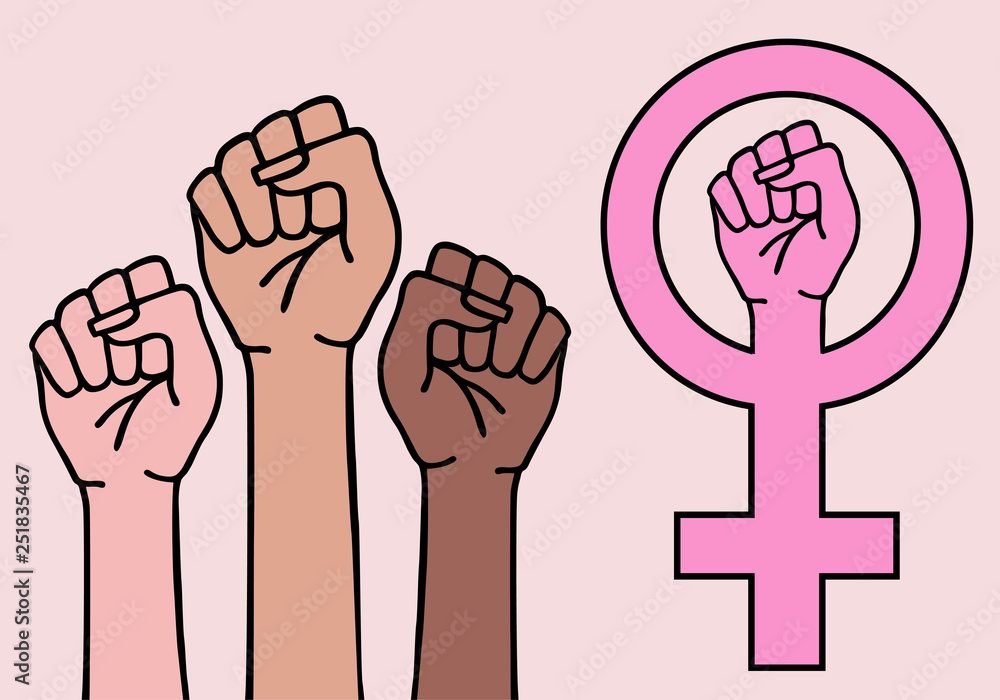Imagine a world where women’s voices aren’t just heard, but actively shape the narrative of our society. Where their experiences, struggles, and triumphs are woven into the very fabric of understanding human behavior. That world is the vision of feminist sociology theory, a powerful lens through which we can examine and challenge the social structures that perpetuate gender inequality.

Image: stock.adobe.com
Feminist sociology theory is a multifaceted approach that seeks to understand how gender constructs our social world and shapes our individual lives. It delves into the power dynamics between men and women, exposing systemic inequalities that often go unnoticed. This exploration is crucial in challenging outdated norms, promoting social change, and creating a more just and equitable world for all.
Deconstructing Gender: A Historical Journey
The roots of feminist sociology theory lie in the late 19th and early 20th centuries, a time when women’s suffrage movements gained momentum. Pioneers like Harriet Martineau, who analyzed the social conditions of women in 19th century England, and Jane Addams, a social reformer and founder of Hull House, laid the groundwork for this field. They recognized that women’s experiences were systematically marginalized, leading to a lack of understanding of their contributions and limitations.
The early feminist sociologists challenged the dominant patriarchal paradigm, arguing that gender was not simply a biological difference, but a social construct. This framework, rooted in the notion that gender roles and expectations are learned and reinforced through social interactions, became a foundational principle for feminist sociology.
Key Concepts and Perspectives
Feminist sociology theory encompasses a wide range of perspectives, each offering unique insights into the complexities of gender relations.
-
Patriarchy: This concept is at the heart of feminist sociology, highlighting the systems of power that prioritize men and marginalize women. It encompasses social institutions, cultural norms, and individual beliefs that reinforce male dominance.
-
Gender Roles and Expectations: Feminist sociologists challenge the idea of fixed gender roles, arguing that they are socially constructed and limit both men and women. They analyze how these roles shape behavior, expectations, and opportunities in all spheres of life.
-
Intersectionality: This groundbreaking concept, developed by legal scholar Kimberlé Crenshaw, highlights how different aspects of our identities, including race, class, and sexual orientation, intersect to shape our experiences of oppression.
-
The Personal is Political: This phrase, popularized in the 1960s, emphasizes that personal experiences are inextricably linked to political structures. Feminist sociology highlights how individuals’ lived experiences, particularly those of women, often reflect broader societal inequalities.
Real-World Applications: Challenging the Status Quo
Feminist sociology theory is not simply a theoretical framework; it’s a tool for action. It has informed countless movements for social justice and equality, driving change in various areas:
-
Workplace Equity: Feminist sociologists have challenged gender discrimination in the workplace, advocating for equal pay, opportunities for advancement, and policies that support working mothers.
-
Reproductive Rights: This field has been instrumental in the fight for reproductive rights, recognizing women’s autonomy over their bodies and their ability to make informed decisions about their reproductive health.
-
Domestic Violence and Sexual Assault: By exposing the power imbalances inherent in these crimes, feminist sociology has paved the way for greater awareness and advocacy for survivors.
-
Education and Socialization: This theory has shed light on the ways gender stereotypes are perpetuated in education, leading to efforts to promote gender-neutral curriculum and combat gender bias in education settings.

Image: www.tes.com
Expert Voices: Shaping the Future of Feminism
Feminist sociologists continue to challenge the status quo, pushing for a more just and equitable society. Here are some key voices you should know:
-
Patricia Hill Collins: A renowned sociologist, Collins is best known for her work on intersectionality and the experiences of Black women. Her book, “Black Feminist Thought”, remains a cornerstone of feminist scholarship.
-
Judith Butler: Butler’s work on gender performativity, the idea that gender is not fixed but a performance, has revolutionized how we understand gender identity.
-
bell hooks: An influential feminist scholar and writer, hooks focuses on issues of race, class, and gender, challenging dominant narratives and advocating for social transformation.
Moving Forward: Empowering Action
Feminist sociology theory empowers us to critically analyze our social world and challenge the systems that perpetuate inequality. You can contribute to this ongoing movement in several ways:
-
Engage in critical thinking: Question societal norms and challenge gender stereotypes.
-
Speak up against injustice: Support initiatives promoting gender equality and advocate for those who are marginalized.
-
Seek out diverse perspectives: Expose yourself to feminist scholarship and engage in respectful dialogue with those who hold different views.
Feminist Sociology Theory
Conclusion
Feminist sociology theory is not just about understanding societal inequalities; it’s about building a movement for change. By recognizing the power dynamics that shape our world, we can challenge the status quo, create a more just society, and empower all individuals to achieve their full potential. The journey towards gender equality is ongoing, and it calls for each of us to be agents of change. Let’s embrace the power of feminist sociology to build a future where gender no longer defines our opportunities or limitations.



/GettyImages-173599369-58ad68f83df78c345b829dfc.jpg?w=740&resize=740,414&ssl=1)


